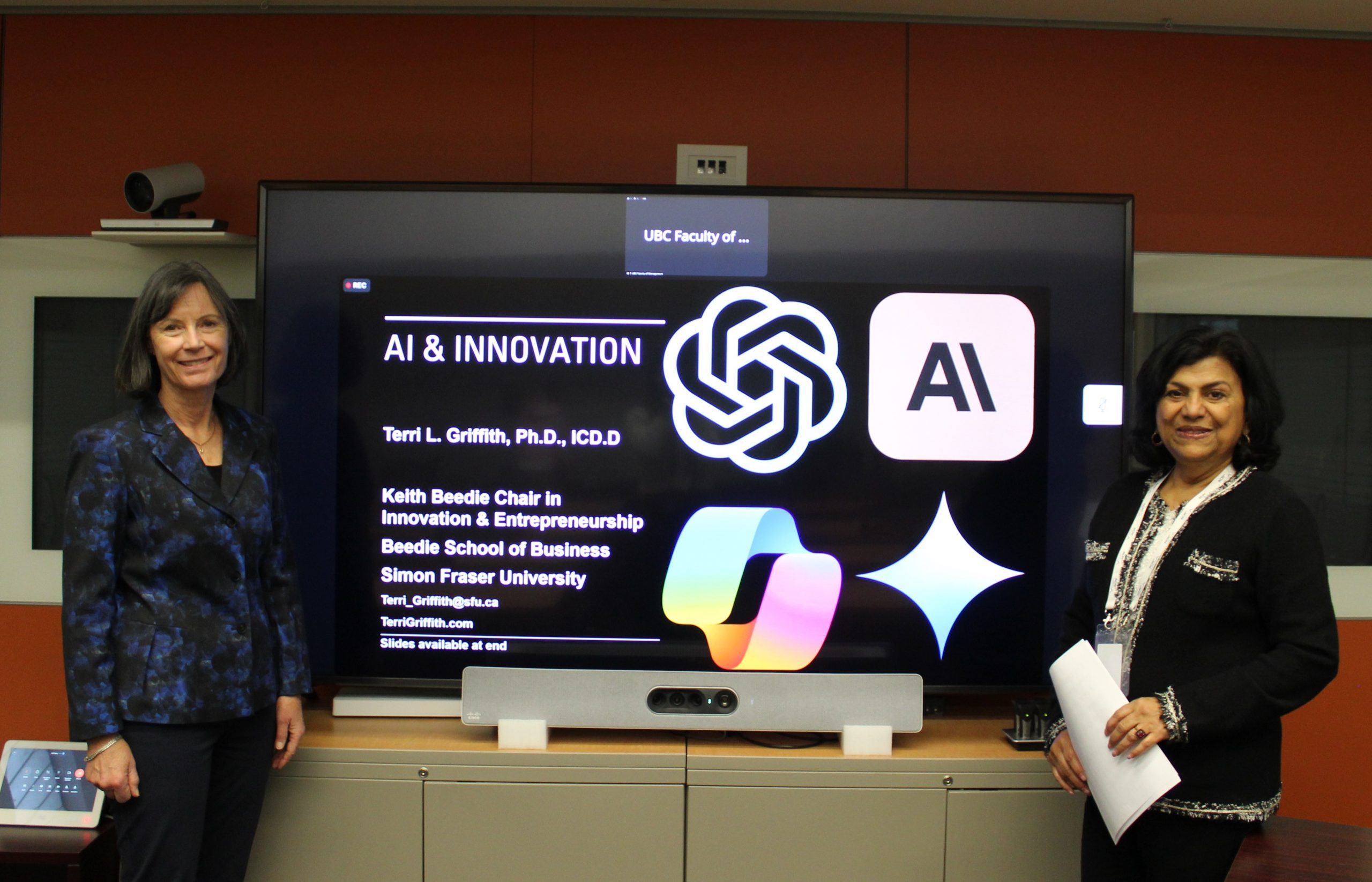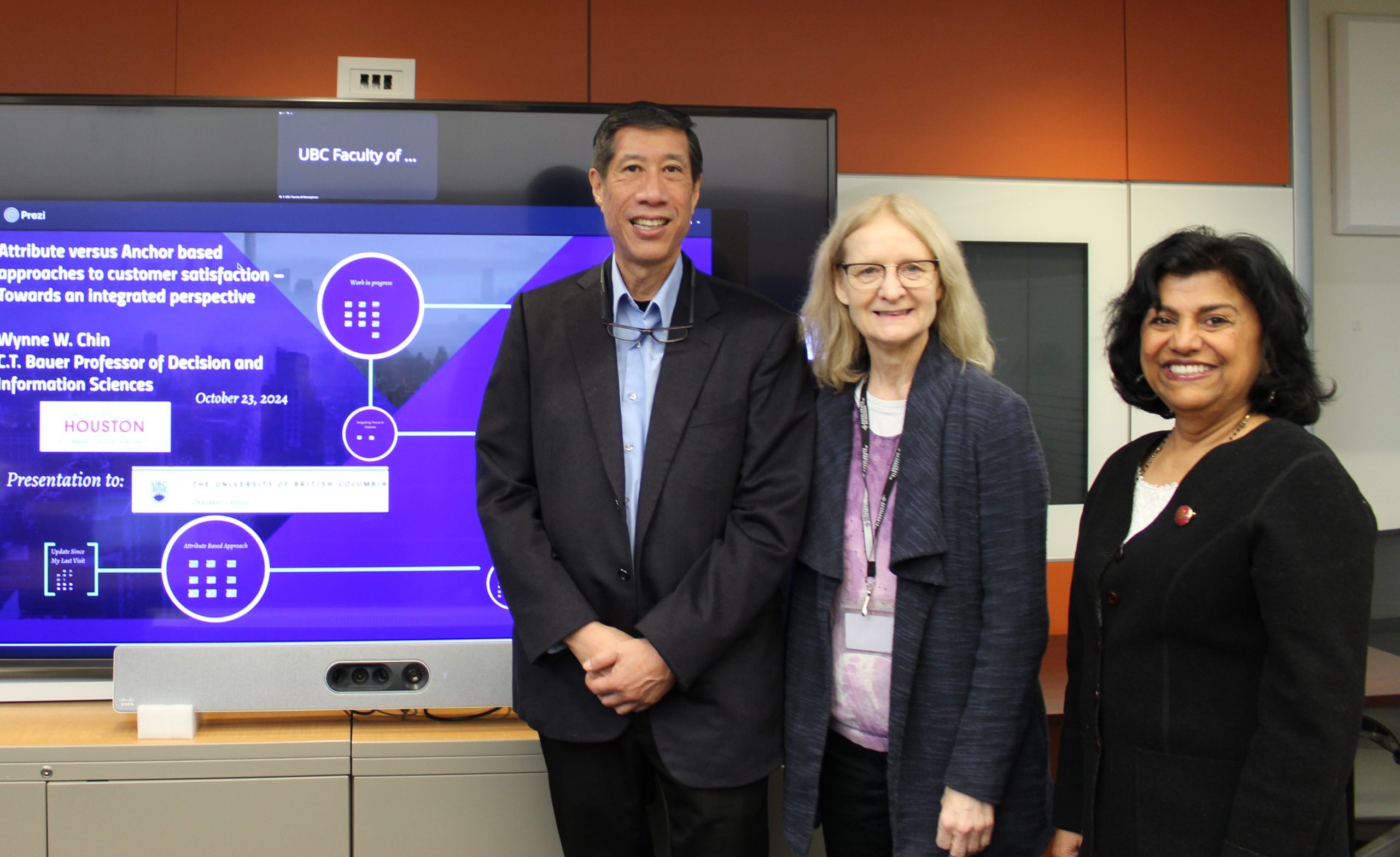2025/2026 IDEAFEST
IdeaFest is series of events designed to spark creativity and innovation. This dynamic forum brings together students, faculty, and industry experts to explore cutting-edge ideas and advancements. Through engaging talks, interactive workshops, and collaborative discussions, participants delve into the latest trends and breakthroughs, fostering intellectual curiosity and interdisciplinary exchange. Idea Fest is not just a series of lectures, but a hands-on experience with thought leaders that encourages creative problem-solving and visionary thinking.
Each on-campus event will be held from 12:00 to 1:00 p.m. in EME 4116.
Registration to attend in-person is not required.
Gendered violence between
humans and robots: rebel robots and human inadequacy
This study explores how consumers perceive and moralize gendered violence between humans and robots, revealing the moral and emotional dimensions of emerging human–technology interactions. Using a projective storytelling method embedded within a 2×2 experimental design, participants were shown graphic panels depicting male aggression across four male perpetrator-female victim pairings: human–human, human–robot, robot–human, and robot–robot. Participants were asked to narrate a possible story for the panel they were shown. Analyzing 80 narratives through grounded theory and abductive reasoning revealed recurring motifs of toxic masculinity, gendered violence, enslavement, and rebellion, alongside empathy, moral reflection, and female triumph. The narratives anthropomorphize robots, attributing evolving emotion, morality, and consciousness to them, while portraying humans as increasingly inadequate before their “immortal” creations. Günter Anders frames this as “Promethean shame,” a framework that also emerged from an abductive analysis of the overall results here. Participants’ stories reveal how aggression toward robots mirrors slavery and colonial hierarchies, patriarchal control, and fears of obsolescence. These findings advance consumer research by reframing consumer–technology interaction from a functional or experiential relationship into one that is moral and affective; it exposes fantasies of dominance and dependen

ce that underlie robot consumption. The study shows how consumers construct the moral boundaries of coexistence with intelligent machines. It also demonstrates a methodological innovation in blending projective, narrative, and experimental approaches.
About Dr. Russ Belk
Russell W. Belk is York University Distinguished Research Professor and Kraft Foods Canada Chair in Marketing at the Schulich School of Business. His research involves the extended self, meanings of possessions, collecting, gift-giving, sharing, digital consumption, and materialism. It tends to be qualitative, cultural, and visual. He has received the Paul D. Converse Award, two Fulbright Fellowships, the Sheth Foundation/Journal of Consumer Research Award for Long Term Contribution to Consumer Research, and is a fellow in ACR, APA, and the Royal Society of Canada.
Why Horizontal Organizations Don’t Fall Flat: Organizational Structure Shapes Perceptions of Egalitarianism and Company Warmth
Recent years have seen a growing number of companies evolving toward relatively “flat” management structures with minimal hierarchical layers of management. Some even leverage flatness as a key marketing message and defining element of corporate identity. Although organizational structure has been studied extensively in various disciplines, its influence on consumer responses has received little attention. This research reveals that a company’s organizational structure can shape consumer perceptions of and subsequent responses to the company. All else equal, perceived organizational flatness (vs. tallness) tends to lead to more positive consumer reactions, such as increased purchase amounts, advertising engagement, purchase intentions, crowdfunding contributions, and brand choice. This phenomenon arises because consumers infer that flatter companies foster relational egalitarianism, which in turn enhances perceived company warmth. However, the positive effect of perceived flatness is not universal. It is reduced or even reversed among people with a lower preference for egalitarianism and those with conservative political ideologies. This work enriches our understanding of how a company’s organizational attributes, which are usually seen as outside the consumer’s purview, may shape consumer perceptions of the company, offering insights for businesses as they embrace new ways of communicating and promoting themselves to consumers.
About Dr. DARREN DAHL

Darren Dahl is the Dean of the UBC Sauder School of Business and the Innovate BC Professor. He’s globally recognized for his work in strategic marketing, entrepreneurship, creativity, and social influence. Dahl is an award-winning academic who is a past recipient of the Killam Research Prize and the 3M Teaching Fellowship. In 2015, he was ranked as the #1 professor worldwide for marketing research by the American Marketing Association. Dahl received his Bachelor of Commerce in Accounting from the University of Alberta in 1992 and his PhD in Marketing from the University of British Columbia in 1998.
Stable and Profitable Trading Platforms for Smallholder Commodity Supply Chains
Digital platforms that connect smallholder farmers with intermediaries offer a promising path to first-mile traceability and improved livelihoods. Yet such platforms face several challenges. Full disintermediation is often impossible because intermediaries are essential for logistics and deeply embedded in local informal relationship networks; stability is fragile, as farmers and intermediaries may revert to trading through local informal networks if they derive insufficient value on the platform; profit margins are tight; and operations are complex due to fragmentation, scale, heterogeneity, and significant uncertainty about local informal networks. To address these challenges, we develop a flexible model of the platform’s joint decisions-matching farmers to intermediaries and setting payments-that captures potential off-platform deviations via local informal networks and enforces stability constraints that preclude them. Deviations are modeled with ambiguity sets that capture the platform’s imperfect information and the breadth of intermediaries’ relationship networks. We prove structural results and, leveraging them, design exact and approximate branch-and-bound algorithms. We pair a case study based on real data from Indonesia’s palm-oil supply chain with a stylized version of the model that we solve analytically, to derive insights regarding the platform’s main decisions. Our findings yield several managerial implications. Profitability depends critically on reducing transportation costs and obtaining at least partial data on informal local networks. Payments should be directed primarily to farmers; surprisingly, if intermediaries have larger relationship networks, platforms should increase payments to farmers and decrease payments to intermediaries, which is the most cost-effective way to ensure stability. In dealing with heterogeneous intermediaries, platforms should use efficient (i.e., minimum-cost) matchings unless some intermediaries have extremely large informal relationship networks, in which case they must be prioritized to ensure stability, despite a loss in efficiency.
About Dr. Dan Iancu

Dan Iancu is an associate professor of operations, information and technology at Stanford Graduate School of Business. A native of Romania, Professor Iancu holds a BS degree in electrical engineering and computer science from Yale University, an SM in engineering sciences from Harvard University, and a PhD in operations research from MIT. Prior to joining Stanford, he spent one year as a Goldstine fellow in the risk analytics group at the IBM TJ Watson Research Center.
Prof. Iancu’s research interests lie at the interface of operations, finance, and risk management. His work develops new tools for dynamic optimization under uncertainty and prescriptive analytics, and applies them to study operational and contracting problems in complex value chains. An area of particular focus in his recent work has been the design of better procurement, payment, and financing solutions in global supply chains, where material and financial flows carry both immediate and long-term impact on the lives of millions of people, and on the environment. His research has been published in Management Science, Operations Research, Manufacturing & Service Operations Management, and Mathematics of Operations Research, and he serves in the editorial board of several of these journals. He was the recipient of several best paper awards (INFORMS Optimization Society 2009, INFORMS JFIG 2013), and of teaching prizes at Harvard and MIT Sloan.
Past Speakers
Why Marketing Managers Need to Understand Fandom Studies
Robert V. Kozinets is an innovator whose methods and theories are widely used by researchers and organizations around the world. In 1995, he invented netnography, an application of ethnographic methods to the understanding of digital interaction. Since that time, he has taught digital research methods combined with marketing and branding theories, practices, and ethics to academics as well as to companies, such as American Express, L’Oréal, Sony, Merck, Nissan, TD Bank, Campbell Soup, and many others. Asking questions about technology, entertainment, religion, and desire, his research empowers a more cultural and passionate approach to the new media economy. He has edited and authored eight books, including Netnography Unlimited (2021). His co-authored work Influencers will be released in 2022. He has more than 120 publications, many of them highly cited articles in top-tier academic journals, as well as seven research videographies and numerous published poems. Kozinets is associate editor at the Journal of Marketing and the Journal of Consumer Research and an incoming chair of the Policy Board of the Journal of Association for Consumer Research. He lives in Los Angeles and enjoys painting, poetry, playing guitar, and gardening.
Towards Artificial General Intelligence in Healthcare
Artificial General Intelligence (AGI) is gaining momentum across disciplines, driven by the rise of powerful large language models (LLMs) and foundation models (FMs), such as ChatGPT. In this talk, Dr. Xiaoxiao Li will first provide an overview of our recent advances in incorporating transformer-based FMs into medical image analysis. Despite their successes, medical FMs face critical challenges, including biases, limited interpretability, insufficient adaptability to clinical contexts, etc. As the focus of this talk, Dr. Li will share our in-depth exploration of these challenges, emphasizing strategies that significantly enhance fairness, robustness, and clinical utility. Additionally, Dr. Li will share our in-depth analysis on critically examining the ongoing debate over whether general-purpose foundation models are justified, considering their substantial cost, or if specialized medical foundation models alone suffice. Ultimately, Dr. Li will outline a practical and theoretical-grounded path forward, highlighting strategies to unlock the full potential of trustworthy and impactful AI in healthcare.
Dr. Xiaoxiao Li is currently an assistant professor in the Department of Electrical and Computer Engineering at the University of British Columbia, a faculty member at Vector Institute. Dr. Li is recognized as a Canada Research Chair (Tier II) in responsible AI and a Cifar AI Chair. Dr. Li’s research interests primarily lie at the intersection of AI and healthcare, theory and techniques for artificial general intelligence (AGI), and AI trustworthiness. Dr. Li aims to develop the next-generation responsible AI algorithms and systems.
Queueing Analytics: Machine Learning, Casual Queueing, and SiMLQ for Data Driven Simulation
The objective of this talk is to expose researchers to the vast possibilities of using modern machinery and data for implementing effective management analytics for processes that can be modeled as queueing systems. Such process are ubiquitous in modern economies, e.g., customers waiting to service, inventory waiting for processing/transportation, payments and invoices waiting to be generated/cleared, computing tasks waiting for resources. I will thus discuss recent developments in queueing analysis based on several papers.
We will start by defining management analytics along descriptive, predictive, comparative, i.e., comparing performance indicators under different interventions, and prescriptive analytics dimensions. We then shortly discuss ML solution for a G/G/1 based upon [1] and its extension to G(t)/G/1 based on [2].
Our main focus would be on causal queueing models, based upon [3]. Not many organizations have queueing theorists (QTs) in their staff, but many organizations employ well trained Data Scientist (DS). Can DS use data to provide accurate comparative analytics without expertise in queueing? We suggest a data-driven representation of system building blocks to create a non-queueing simulator without prior knowledge of the system. We show that this approach is effective in comparative analytics, when analyzing expected waits for an GI/M/1 with speed-ups. We first demonstrate that DS can successfully refine the parent sets of queueing variables from data using an off-the-shelf algorithm (even under a moderate sample size). We then use machine learning to estimate the causal structure in this queue, e.g., the Lindley’s Recursion and use the G-computation to derive inference results of counterfactual interventions. For the GI/M/1 with speed-ups, we compare the performance of estimates obtained by a QT, who uses data driven estimates for the primitives of the queue, with those made by a DS that uses either parametric (where inter-arrival and service time distributions are known) or nonparametric (where both distributions are unknown) estimators. We find that the errors of the DS that requires no knowledge of the system’s dynamic and its features and these of the QT (which requires this knowledge) are comparable. Our results suggest that the DS approach would be effective for practical setting- where even experts QTs cannot provide closed-form results.
We will finish with a short demo of SiMLQ. SiMLQ software uses Machine Learning to automate the visualization, Simulation, and optimization of Queueing processes. SiMLQ automatically constructs data-driven simulation models from event-log data collected by common information systems and enables users to improve processes resource management, increase efficiency, reduce cost, and manage risks. SiMLQ- from data to action.
About Dr. BARON
Opher Baron is a Distinguished Professor of Operations Management at the Rotman School of Management, University of Toronto. He was a visiting associate Professor at the Industrial engineering and Management faculty of Technion (2009/10) and a visiting Professor at the School of Information Management and Engineering, Shanghai University of Finance and Economics (2016/17). He also served as the Academic Director, MMA Program (2021-2023), and the Operations management and statistics area coordinator (2015-2021). He has a PhD in Operations Management from the Sloan School of Management at the Massachusetts Institute of Technology, and an MBA and BSc in Industrial Engineering and Management from The Technion. On the teaching front, Opher is especially proud of the modeling and analytics courses he introduced and teaches at Rotman. On the application front he is proud of launching the Covidppehelp.ca platform with his colleagues. This platform has facilitated the flow of millions of PPE items to end-user customers during the global Covid19 pandemic. His research interests include queueing, business analytics, service operations (such as healthcare), autonomous vehicles, and revenue management. Opher’s work is published in leading journals such as Operations Research, and Manufacturing & Service Operations Management, and he has won several research and teaching awards and grants, including the 1000 Talents Plan Scholar from the Shanghai Municipal Government, 2017 and the Rotman 2023 Distinguished Scholarly Contribution Award. Opher is active in the operations research and operations management community. He has given numerous invited keynote lectures and seminars, chaired several conferences, clusters, and sessions, and is currently serving on the advisory board and editorial boards of several journals.
AI from the Bottom Up: Can Work Crafting Save Jobs?
Generative AI burst on the scene in November of 2022, on the heels of calls to “return to work” following the COVID-19 office shutdown. We’ve all been whipsawed regarding how we live, work, and play. Machine learning changes the tools of our research. Generative AI changes how we teach and our students learn. The most successful at games are often neither expert humans nor AI, but rather human-AI ensembles. Our computer science and engineering colleagues work at a pace generally faster than ours in social science. Leveraging AI from the bottom up may help us keep up and adjust how we approach our creativity and innovation.
About Dr. Griffith
Terri L. Griffith holds the Keith Beedie Chair in Innovation and Entrepreneurship at Simon Fraser University’s Beedie School of Business and was the 2022 President of ISSIP, The International Society of Service Innovation Professionals. She is a member of the New Ventures BC Society Board of Directors and the advisory board of Geopogo. Terri has served as a Senior Editor for Organization Science, as Associate Editor for MIS Quarterly, and is Co-Editor for an upcoming artificial intelligence special issue in Small Group Research. She spent two decades in the Silicon Valley and was recognized by the Silicon Valley Business Journal as a Woman of Influence following the publication of her book, The Plugged-In Manager: Get in Tune with Your People, Technology, and Organization to Thrive. Her most recent research uses large-scale methods to take a “bottom-up” approach to automation and the future of work, including artificial intelligence. Terri’s credientials include: BA UC Berkeley; MS, PhD Carnegie Mellon University; ICD.D, ICD-Rotman Directors Education Program.
The Double-Edged Sword of AI: Market Gains and Inequality Concerns
We examine the effects of artificial intelligence (AI) adoption on stock market performance, volatility, and income inequality, with a focus on businesses of varying sizes (small, medium, and large). Our findings reveal that AI adoption significantly boosts stock market performance, particularly among large firms, while slightly reducing market volatility, indicating a stabilizing effect. However, it also exacerbates income inequality, evidenced by a 1.2% annual rise in the Gini index and a 5.2% decline in competitiveness. We observe a convex relationship between business size and AI adoption, likely driven by the high fixed costs associated with transitioning to AI, which disproportionately benefit larger firms. This relationship underscores the challenges faced by smaller businesses in adopting AI at the same pace. Our cross-country analysis indicates that more innovative nations, with strong university-industry R&D collaboration and top-ranked universities, exhibit higher levels of AI adoption. While AI improves market performance and stability, it also widens inequality and diminishes competitiveness, pointing to the need for targeted policy measures. Importantly, AI adoption does not lead to increased unemployment, providing some reassurance about its broader economic implications.
About Dr. Bonaparte
Professor Yosef Bonaparte, Ph.D., a finance scholar graduated from the University of Texas at Austin in 2008, is a leading researcher in Fintech, specializing in Crypto, Blockchain, AI, and ML. With numerous publications in esteemed journals such as the Journal of Financial Economics and Management Science, he’s a recognized authority in financial innovation. Dr. Bonaparte’s influential works have been featured in top-tier media like The New York Times and CNBC. As an accomplished educator, he imparts knowledge in various classes, including FinTech, Crypto & Blockchain Investing, and Entrepreneurship in Finance. His multidimensional expertise continues to shape the finance landscape.
Attribute versus Anchor based approaches to customer satisfaction- An integrated perspective
This talk will focus on nearly two decades of research by the presenter on understanding satisfaction formation within an Information Systems context. Both attribute and anchor-based approaches will be presented along with a first attempt on how to integrate these two perspectives. For the attribute-based approach, the role of IS service satisfaction is introduced as a potential factor in forming overall satisfaction. For anchor-based models, this talk suggests the need to consider other anchors beside prior-expectation. Furthermore, among the 7 approaches for assessing anchor-based judgements, the efficacy of a new modified affect percept (MEPD) approach will be presented.
About Dr. Chin
Wynne W. Chin is the C. T. Bauer Professor of Decision and Information Sciences in the C.T. Bauer College of Business at the University of Houston. He is known for Partial Least Squares Path Modeling with his PLS-Graph software being the first graphical based PLS software developed in 1986 and released widely in 1990. Over his 35 year span, he was the first to introduce the use of Monte Carlo simulation to the IS discipline for evaluating structural equation modeling algorithms. He also introduced bootstrapping for PLS analyses in 1988, two approaches for 2nd order models (1995), product indicator (1996, 2003) and Orthogonalizing (2010) for interaction effects, PLS nonlinear modeling (1996), multigroup comparison via bootstrap with t-test formula (2000) and permutation (2003, 2016), bootstrap cross-validation (2005), latent marker variable for common method bias (2013), and bootstrap differential path tests (2013). Wynne’s research has received over 98,000 citations, with a top-ten most cited paper in MIS Quarterly and top-five most cited papers in Information Systems Research, and ranked third overall in first authored articles published in MISQ and ISR for the period from 1990 through 2016, as well as a Google Scholar H-index of 69 placing him among the most impactful researchers in his field. Wynne is the 8th most cited researchers related to structural equation modeling. He is also ranked 9,994 in the world in the career database and 3,215 in the world in the 2019 single year database according to a 2019 research article list of the top 6.88 million scientists in the world for all disciplines in 22 fields and 176 subfields. For his main field of Information and Communication Technologies, Wynne ranks 295 and 147 out of 570,025 scientists for career and single year contribution respectively. He was awarded with Fellow of the Association of Information Systems in 2013, garnered an AIS Distinguished Member – Cum Laude designation in 2020, and a AIS Technology Legacy Award (ATLAS) in 2021 recognizing those who have served the community in a significant way through their lifetime. Dr. Chin recently received the Farfel award (the highest faculty honor at UH). He currently serves as the treasurer for both the Texas Council of Faculty Senates and the National Council of Faculty Senates of which he is also a founding member.
Co-creating Educational Consumer Journeys: A Sensemaking Perspective
About Dr. Wilner
Dr. Sarah Wilner is Associate Professor of Marketing, Chair, Brand Communications and Academic Director for PhD and Research-Based Masters Programs in Management at Wilfrid Laurier University’s Lazaridis School of Business and Economics. She studies marketing and brand management (especially how marketers interpret consumers and vice versa); product/service innovation and design and consumer culture. Sarah specializes in qualitative methods of inquiry, investigating phenomena by being immersed in them. Wilner is an award-winning researcher and educator: her paper (with co-authors), “Doing Design Thinking: Conceptual Review, Synthesis and Research Agenda” won the Journal of Product Innovation Management‘s Thomas P. Hustad Best Paper of 2019 award and she is the recipient of the Lazaridis School of Business and Economics Innovation Award. At Laurier, Wilner has taught at every level (sometimes concurrently!), including BBA, MSc, MBA and PhD courses. She has also taught Masters students in Canada, Denmark, France and Japan.
Entrepreneurial Impacts of Blockchain-backed Financing: Do Public Token Offerings Slowdown or Accelerate Innovation in Startups?
About Dr. Havakhor

Taha Havakhor is an Associate Professor of Information Systems and a Desautels Scholar at Desautels Faculty of Management at McGill University. In 2021, he won the Early Career Award from the Association for Information Systems (AIS). Prior to joining McGill, he was the Research Director of the Institute for Business and Information Technology (IBIT) and Assistant Professor of Management Information Systems at the Fox School of Business at Temple University. His research focuses on combining advanced computational and econometrics approaches to address problems at the intersections of science, technology, and economics. His scholarly work has been published/accepted in premier outlets such as Management Science, MIS Quarterly, Information Systems Research, Harvard Business Review, Journal of Marketing, Information Systems Journal, and the Journal of Management Information Systems.
Are Targeted Matching Schemes Effective in Stimulating Retirement Savings?
ABOUT DR. POLIDANO
Dr. Cain Polidano is a Principal Research Fellow at the Melbourne Institute, a research-only department with the Faculty of Business and Economics at the University of Melbourne. His work is often in partnership with government and involves the use of administrative data and econometric tools to conduct research to inform education, Indigenous and retirement policy. Currently he is working on Australian Research Council Grants related to Indigenous entrepreneurship, impacts and drivers of Australia’s frontier wars and equity and effectiveness of retirement policies. Prior to completing his PhD, Cain was a Senior Economist within the Australian Government.
Inverse Optimization to Learn Personalized Diets
About Dr. Ghobadi
Kimia Ghobadi is a John C. Malone Assistant Professor in the Department of Civil and Systems Engineering. She is an associate director of the Center for Systems Science and Engineering, a chair member of the Malone Center for Engineering in Healthcare, and a member of the Center for Data Science in Emergency Medicine. Her research focuses on using mathematical models, optimization techniques, and data analytics to solve problems in complex systems, particularly in healthcare systems and medical decision-making environments. She develops models and solution techniques in inverse optimization, mixed-integer programming, and online algorithms.
How Philosophy can contribute to Public Policy? The Case of Education
ABOUT DR. STOJANOV
Krassimir Stojanov is Professor and Chair of Philosophy of Education at the Catholic University of Eichstaett-Ingolstadt, Germany, and co-founder of the new Institute of Philosophical Research in Education in Munich. Main topics of his research are educational and transnational justice, human flourishing and its social prerequisites and conditions, critical social theory, philosophical foundations of democratic education, among others. He is author of many articles in English and German as well as of several books on these topics including “Education, Self-Consciousness, and Social Action. Bildung as a Neo-Hegelian Concept” (Routledge 2018) and “Education against Populism?! On Anti-Democratic Half-Education and Its Alternatives” (Springer 2022, in German). Further major recent publications of him are Inclusive Universalism as Normative Principle of Education. In: Educational Theory, Volume 73, Issue 2 (2023), pp. 245-257; Global Justice and Democratic Education. In: Culp J, Drerup J, Yacek D (Eds.): The Cambridge Handbook of Democratic Education. Cambridge University Press, Cambridge 2023, pp. 281-297; Democratic Education and Epistemic Justice. In: Webster/ Airaksinen/ Batra/ Koschevnikova (Eds.): Humanizing Education in the 3th Millennium. Springer. Singapore 2022, pp. 83-91
Do Remote Workers Deter Neighborhood Crime? Evidence from the Rise of Working from Home
About Dr. Matheson
Jesse Matheson is a Professor in the Department of Economics at the University of Sheffield. He has previously taught at the University of Leicester and the University of Calgary. Jesse studied economics in Canada at the University of Calgary (BA, PhD) and Queen’s University (MA), before moving to the UK in 2011. In 2015 he was a visiting scholar at Cornell University. Jesse’s work covers topics in public, labour and health economics. Previous work considers the effectiveness of policy interventions that target vulnerable populations. This includes a large-scale randomised field study in policing domestic violence. He has also published research on the effect of social and neighbourhood infrastructure on individual decisions in the context of smoking, marriage, and raising children. Jesse’s recent research explores the economic determinants, and consequences, of the spatial distribution of labour within urban settings. Of particular interest is how the post-pandemic rise in remote working is shifting economic activity and changing cities.
How Do Product Returns Affect Supply Chain Performance and Sustainability?
About Dr. Ülkü
Ali Ülkü, Ph.D., P.Eng., is a Full Professor in the Faculty of Management and the (founding) Director of the Centre for Research in Sustainable Supply Chain Analytics (CRSSCA) at Dalhousie University, Halifax, NS, Canada. He has a Ph.D. in Management Sciences (Waterloo), an M.Sc. in Operations Research (Çukurova), and a B.Sc. in Industrial Engineering (Bilkent). His research includes sustainable supply chain and logistics systems, manufacturing and service operations analysis, green marketing and optimal contract designs, analytical modeling of sustainable production and consumption, and interdisciplinary, community-based policy problems. His publications appear in such journals as the International Journal of Production Economics, Journal of Business Research, Journal of Retailing and Consumer Services, Journal of Cleaner Production, and Service Science. His co-edited book, Big Data Analytics in Supply Chain Management: Theory and Applications, was published in 2020 (CRC Press). He is an Associate Editor for INFOR: Information Systems and Operational Research. A recipient of teaching excellence awards, he has taught operations and supply chain management, business analytics, optimization, logistics, and transportation courses at various universities in Canada, Türkiye, and the USA. Dr. Ülkü was honored with the 2019 Distinguished Professor Award by the IEOM Society International and is a 2023 Global Triple-E Awardee (Education Champion).


